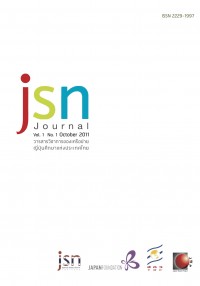ผลการฝึกแชโดอิ้งต่อการพัฒนาทักษะการพูด: ด้านความเร็วและความถูกต้อง
Main Article Content
Abstract
งานวิจัยนี้มีวัตถุประสงค์เพื่อศึกษาผลการฝึกแชโดอิ้งของ ผู้เรียนภาษาญี่ปุ่นชาวไทยที่มีต่อการพัฒนาทักษะการพูด โดยใช้ ความเร็วในการอ่านออกเสียงก่อนและหลังฝึกแชโดอิ้ง และความถูกต้องในการออกเสียงขณะฝึกแชโดอิ้งเป็นดัชนีชี้วัดทักษะการพูด และเพื่อสำรวจลักษณะการออกเสียงที่ผิดและความคิดเห็นของผู้ฝึก แชโดอิ้งที่มีต่อกิจกรรมการฝึกแชโดอิ้ง ผลการศึกษาพบว่า 1) การฝึกแชโดอิ้งมีประโยชน์ในการพัฒนาทักษะการพูดให้เร็วและคล่องขึ้น 2) การฝึกแชโดอิ้งช่วยแก้ไขการออกเสียงที่ผิดได้ โดยเฉพาะอัตราความถูกต้องในการออกเสียงจะดีขึ้นอย่างเห็นได้ชัดในการฝึกครั้งที่ 2 เมื่อเทียบกับครั้งแรก 3) ข้อผิดที่พบในการออกเสียง ได้แก่ การเน้นเสียง สูงต่ำในคำประสม การออกเสียงคำที่มีเสียง ち、つ การออกเสียง คำยืม จากภาษาต่างประเทศ และการออกเสียงสำนวนท้ายประโยค และ 4) ผู้ที่ฝึกแชโดอิ้งรู้สึกว่าการฝึกแชโดอิ้งมีประโยชน์ โดยรู้สึกพึงพอใจในระดับมากถึงมากที่สุด ในด้านการพัฒนาการออกเสียงของ ผู้ฝึกเอง ช่วยให้ออกเสียงได้คล่องขึ้นเป็นธรรมชาติเหมือนเจ้าของภาษามากขึ้น และตระหนักรู้ถึงข้อผิดพลาดในการออกเสียงของตนเองอันนำไปสู่การแก้ไขเสียงที่ผิดได้ด้วยตนเอง ผู้ฝึกแชโดอิ้งทุกคนระบุว่าความน่าสนใจของเนื้อหาที่ใช้ฝึกมีส่วนในการส่งเสริมการเรียนรู้ สำหรับระดับความยากง่ายของเนื้อหาที่ใช้ฝึก หนึ่งในสามของผู้ฝึกคิดว่าไม่จำเป็นต้องเป็นเนื้อหาที่ง่าย ซึ่งสะท้อนให้เห็นว่า ผู้ฝึกส่วนหนึ่งต้องการการฝึกที่ท้าทายด้วย
The Effects of Using Shadowing on Improving Oral Skills: Emphasis on speed and accuracy
Tasanee Methapisit
Faculty of Liberal Arts, Thammasat University
This paper aims to investigate the effects of shadowing on improving students’ oral skills in the Japanese language. In this study, the speed of oral reading before and after training with shadowing techniques, and accuracy of speech, were used as oral skills indicators. Types of errors and the attitude of students towards shadowing activities were also addressed. The results revealed the following: 1) the shadowing techniques were useful in improving the speed of oral reading; 2) the shadowing techniques improved accuracy of pronunciation—especially significant improvement was found between the first and second use of shadowing activities; 3) pronunciation errors were found in the speech: accents, for example, with compound words, with the “chi” and “tsu” sounds, in the pronunciation of loanwords, and in the intonation of sentence-final expressions; 4) the subjects of the experiment felt that shadowing techniques were the most useful for improving their own pronunciation, helping them to pronounce more naturally and with fluency, and that the techniques helped them to gain awareness of their own pronunciation. All subjects of the experiment confirmed that interesting material could motivate their learning. As for the difficulty level of the material, one third of the subjects stated that it was not necessary to use easy material, which implies that they need a challenge in their training.
Article Details
ข้อความและข้อคิดเห็นต่างๆ ในบทความเป็นของผู้เขียนบทความนั้นๆ ไม่ใช่ความเห็นของกองบรรณาธิการหรือของวารสาร jsn Journal


